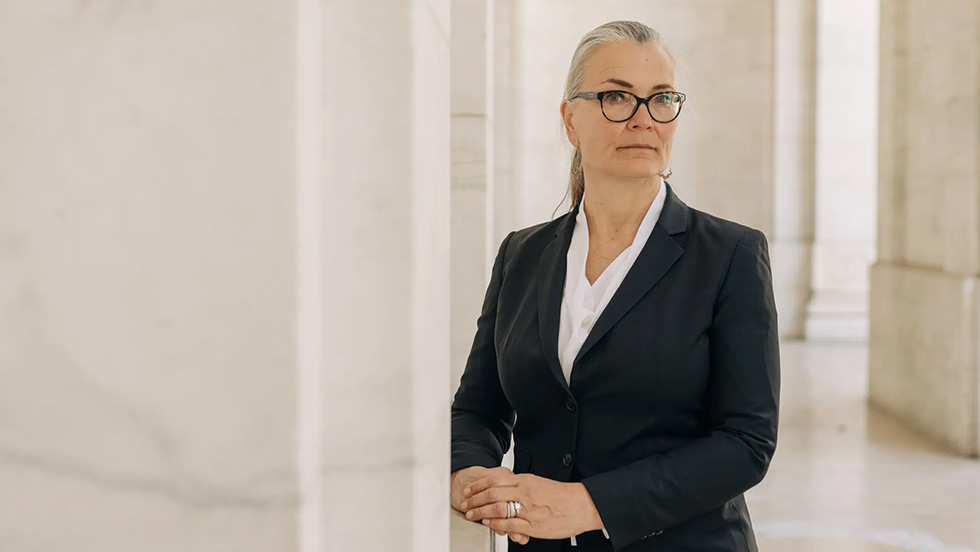
The Gordon F. Derner School of Psychology now has a very special student in Helen Bua, Esq., who was recently featured in The New York Times and is currently an attorney for the Queens County Family Court in Queens, New York. She decided to make a significant career change and study psychoanalysis. Learn how Adelphi supports career changes at any age.
Why would a lawyer who advocates for children and parents in the New York City court system decide to change careers and become a psychotherapist?
“I realized I would rather work with people in crisis, not from the role of an attorney, but on a deeper and more transformative level,” said Helen Bua, JD, an attorney on the Assigned Counsel/Attorneys for Children panel in Queens County Family Court. “I felt this would allow me to potentially have an even greater impact on people’s lives.”
Bua, whose work in the courts for those in crisis has been noted in The New York Times, is pursuing her new calling in the License Qualifying Program in Psychoanalysis (LQPP), a postgraduate program in the Adelphi University Gordon F. Derner School of Psychology.
The five-year, part-time program in psychoanalysis is specifically designed to help non-mental health professionals with advanced degrees—like Bua, a licensed attorney with a master’s degree in social work—become psychotherapists. Thanks to the program’s flexibility, Bua has been able to pursue her studies while continuing to work as an attorney.
“Helen is a lifelong learner and the embodiment of the idea that smart women reinvent themselves,” said Amira Simha-Alpern, PhD, director of Adelphi University postgraduate psychology programs. “She brings into her new career as a psychoanalyst maturity, wisdom and passion to alleviate suffering.”
Helping people in crisis
Before making this transition, Bua had built a varied and extensive career in law. She has prosecuted and defended juvenile defendants in family court, worked as a career counselor for graduates at Brooklyn Law School, run the HIV/AIDS law project at Harlem Legal Services, and supervised social workers managing the cases of children in foster care.
“I’d always had a vision for my professional life that involved helping people in crisis, people in need,” Bua said. “And that has taken me to a variety of places.”
In her current role in Queens Family Court in New York City, she represents children and indigent adults in a full range of proceedings, mainly custody and visitation, child abuse and neglect, and domestic violence cases.
As a sole practitioner, Bua is able to determine her own caseload and schedule. So when she first developed an interest in psychotherapy, she had the flexibility to make a change and pursue this new career path.
A desire to dig deeper
Bua first discovered her interest in psychotherapy as a career when she started seeing a psychotherapist herself in 2019.
“I was immediately intrigued, challenged and growing,” Bua said. “Not just personally, but I really felt that the therapy was impacting my ability to relate to and understand my legal clients, many of whom would’ve benefited from therapy or psychoanalysis.”
That’s when it dawned on her: “I thought, ‘Why am I continuing to provide legal services to people when I could be providing therapeutic services, when I could conduct deep analysis with them?’”
Discovering the psychoanalysis program at Adelphi was a game changer. Bua could start building her new career without having any clinical background or medical license. Since classes were held at night, she could also continue working in her current role while preparing to open her own psychotherapy practice down the line.
“I honestly feel like the Adelphi program is a best-kept secret,” she said. “I’m almost shocked at myself for not having found it sooner.”
Continuing to make an impact
While there are similarities between law and psychotherapy—namely, an opportunity to help people in crisis—Bua has found herself appreciating the differences.
“As an attorney, you’re very much dealing with the surface [of the issue]; you’re concerned with facts and what you can prove,” she said. “Whereas working therapeutically and psychodynamically, you are much more concerned with feelings and how the individual has experienced them. It’s a very different approach, to really slow down and dig deep.”
Now at the end of her first year in the LQPP program, Bua hopes to spread the word about this unique academic offering, especially as there is a growing need for licensed mental health professionals.
“It’s a viable, high-quality option for people who might want to make a transition—and not just lawyers,” Bua said. “It’s really available for anyone that would like to slow down and have a deeper impact on the people they’re trying to help.”